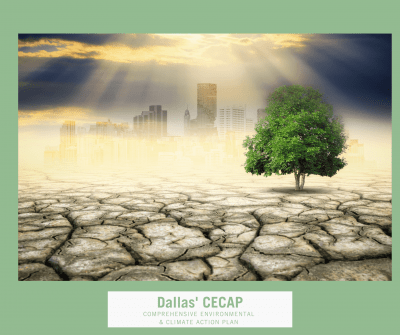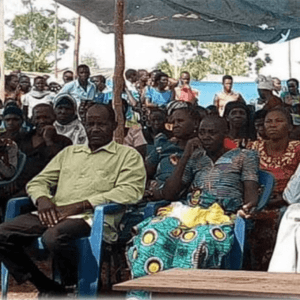Five months ago, on May 27, 2020, the Dallas City Council unanimously passed the Comprehensive Environmental & Climate Action Plan (CECAP) to outline a plan for addressing environmental issues here in Dallas.
According to the World Bank, in 2015, Texas emitted a total of 626,500,000 metric tons of carbon dioxide, the most of any state in the country. The city of Dallas alone contributed to about 3% of those emissions, releasing 19,529,600 metric tons of carbon dioxide. Dallas’ greenhouse gas (GHG) emissions mainly come from buildings and energy (64%) and transportation (35%).
If no action is taken, Dallas is expected to experience increasingly severe weather, including hotter temperatures and severe droughts in the summers, and colder, wetter winters. The Federal Reserve Bank of Dallas cites that this increased weather variability will negatively impact our food system and water supply. Additionally, the Dallas Fed states that climate change is likely to have significant economic implications in the long term.
Despite the U.S. backing out of the Paris Agreement, Dallas, along with 466 other cities, committed to upholding the agreement’s goal of reaching carbon net neutrality by 2050 in order to limit the level of global warming to 1.5 degrees Celsius or less. The CECAP proposes 97 actions that the city can take in order to reach this goal. The actions are organized into 8 sectors – buildings, energy, transportation, waste, water, ecosystems, food & agriculture, and air quality. Some actions include: updating the city’s building code to support solar-ready construction and transitioning the city’s buses to be 100% electric.
In addition to defining actions the city will take, the plan suggests what residents and businesses can do to help the city reach its goals in each of the 8 areas. For example, did you know you can recycle electronics such as computers, TVs, printers, etc.? To find out which items can be recycled and where, check out the Dallas Electronic Recycling Program. Another suggestion is for businesses and individuals to volunteer their time with Texas Trees Foundation to plant trees in order to help keep our community cool.
Pharr Andrews, Senior Climate Coordinator at the City of Dallas, says that the city’s focus for the first year of implementation is around capacity building. “The city cannot achieve these goals on our own. We need businesses and the community to join us in making this plan a success.”
To read more about the city’s plan to address climate change and what you can do to help combat its effects, see the full CECAP here.
To read more about the Hunt Institute’s work to develop future-focused solutions to some of the world’s biggest problems, please click here. For the latest news on the Hunt Institute, follow our social media accounts on LinkedIn, Facebook, Twitter, and Instagram. We invite you to listen to our Podcast called Sages & Seekers. If you are considering engaging with the institute, you can donate, or sign-up for our newsletter by emailing huntinstitute@smu.edu.












